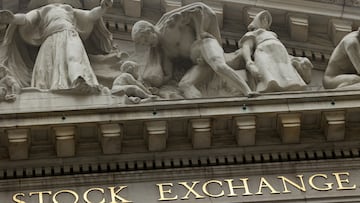What have been the biggest declines in U.S. stock market history, and how have they affected people?
A look at the largest economic downturns in US history and the economic toll they took on the population.


The United States saw all major stock market indices fall on Monday, August 5, as concerns over a possible slowdown in economic growth led to a selling spree... Or, that is one hypothesis. Another is that as investors saw the promise of AI and the profits it could generate, they lost sight of the timeline that those profits would arrive and placed their bets too early. For some experts, what was seen yesterday was a price readjustment of the market to bring stock prices closer to what investors see as their “true” value.
Futures for all three major indices, the S&P500, the Nasdaq, and the Dow Jones were all trading in the green before markets re-opened on Tuesday, a sign that current conditions and the presumed risk felt by investors is a blip rather than a trend that indicates a structural issue with the US economy that could lead to a recession. While that is a much more positive story, only time will tell whether it is the one that will be remembered or if the labor market is showing signs that a recession is on the horizon as hiring slows and fewer jobs are added.
While investors have tremendous power in the US economy, it is critical to remember that those who are most likely to suffer during an economic downturn are the fifty percent of American workers who don’t own stocks. Those who work in precarious industries like construction and hospitality are at the whim of the boom and bust cycle of the economy. They have no control over the economy; their own option is to be subject to it. The inequities in economic power in the US are never discussed. Instead, economic and political leaders argue a counterfactual that if the stock market were not to exist, those with no stake in it would be worse off.
The Great Depression remains unmatched
There has never been a downturn of that scale since the Great Depression, the economic crisis of the late 1920s and early 1930s. In October 1929, the Dow Jones fell by 38 percent in a single day, known as ‘Black Tuesday.’ The unemployment rate shot up to 25 percent, and millions of people lost everything and were forced out into the streets to live lives of despair.
Read more from AS USA:
Quick response limited economic pain during the Covid-19 economic crisis
The last major economic downturn, the impact of which was minimized due to swift intervention from the central bank and federal government, occurred in March 2020 as the COVID-19 pandemic took hold of the US and practically every other country on earth. On February 21, the Dow Jones Industrial Average soared to its highest level on record at the time, 28,992 points, and just a month later, on March 20, the index had fallen to 19,173 as millions had been laid off and consumer spending was expected to plummet. However, thanks to federal stimulus checks and enhanced unemployment benefits, the US economy stayed afloat as people remained home in March and April. By the end of the year, the Dow had surpassed 30,000 points, and unemployment was trending downward.
The impacts of the Great Recession
Before that, there was the Great Recession, which began in December 2007 after the housing market crisis. Unlike the COVID-19 response, the US federal government was slower to respond, and the bank bailout helped corporations and those who had created the crisis much more than those who lost their retirement savings, jobs, or homes. Between October and December 2008, the Dow Jones fell by over 25,000 points.
Unemployment doubled between 2007 and 2009, and in October 2009, the country reported an unemployment rate of 10 percent.
Mauricio Soto, writing for the Urban Institute, found that retirement accounts were hit particularly hard, with those closest to retirement faring the worst. Altogether, by December 2008, retirement accounts had lost 32 percent of their value, or around $2.8 trillion.
Related stories
The federal response to the Great Recession was not as substantive as some economists had called for because of political and ideological reasons. Republicans, who had lost control of the White House and both chambers of Congress, were reluctant to support an economic recovery that would be politically advantageous for the Democrats. And, some Washington insiders tasked with the recovery spouted off about concerns of moral hazard, the economic concept that if there are no repercussions for poor choices, people will engage in overly risky behavior. Political satirists questioned Jon Stewart and Treasury Secretary Janet Yellen about this economic logic and the frustration many felt watching the banks get bailed out while they suffered.
So, while the banks received billions in public money for their engineered crisis, those impacted by the decisions of the big banks who had been tricked into taking on mortgages that they would not be able to afford paying the price for the institutional failures of the powerful.
Complete your personal details to comment